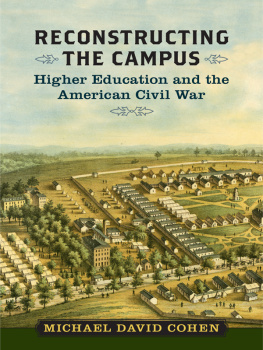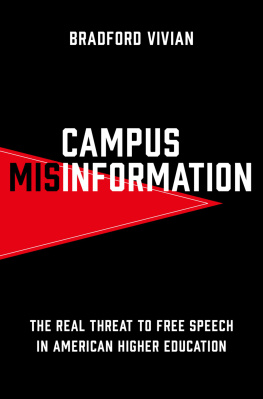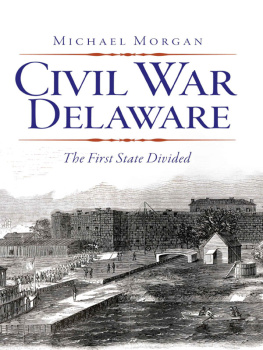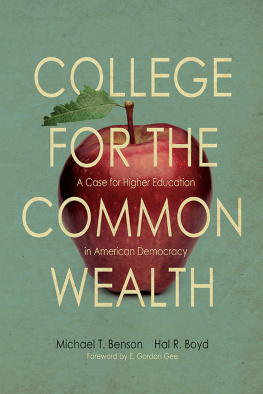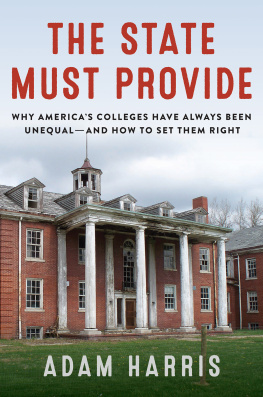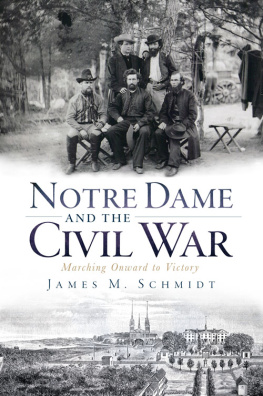University of Virginia Press
2012 by Michael David Cohen
All rights reserved
Printed in the United States of America on acid-free paper
First published 2012
9 8 7 6 5 4 3 2 1
Library of Congress Cataloging-in-Publication Data
Cohen, Michael David, 1980
Reconstructing the campus : higher education and the American Civil War / Michael David Cohen.
p. cm. (A nation divided : studies in the Civil War era)
Includes bibliographical references and index.
ISBN 978-0-8139-3317-7 (cloth : alk. paper) ISBN 978-0-8139-3318-4 (e-book)
1. United StatesHistoryCivil War, 18611865Education and the war. 2. Universities and collegesUnited StatesHistory19th century. 3. Universities and collegesUnited StatesAdmissionHistory19th century. 4. Universities and collegesCurriculaUnited StatesHistory19th century. 5. Education (Higher)United StatesHistory19th century. 6. Educational changeUnited StatesHistory19th century. 7. United StatesHistoryCivil War, 18611865Influence. I. Title.
E541.C65 2012
973.7071'1dc23
2012000870
Acknowledgments
W riting a book involves many hours spent alone in an archive or at a computer. But it is hardly done in isolation. This book has benefited immensely from the advice, feedback, assistance, and support of many individuals and organizations. It began at Harvard University, where my readers guided me through the process of turning an idea into a dissertation. Nancy Cott, my adviser, continually impressed me with her intellectual rigor and wide-ranging knowledge. She helped me to clarify my arguments and to see the importance of my own findings. Julie Reuben contributed expert knowledge, careful readings, and kind encouragement. Susan ODonovan offered original and insightful readings with unfailing enthusiasm. More recently, the Department of History and the Correspondence of James K. Polk Project at the University of Tennessee, Knoxville, have provided me a rich and welcoming intellectual home as I have refined my work into a finished book.
I thank those colleagues who read chapters and provided feedback: Drew Gilpin Faust, Roger Geiger, Katherine Reynolds Chaddock, Tom Chaffin, the late Martin Trow, and the members of the Boston-area History of Education Group, the Harvard history-of-education graduate student group, and the Harvard Nineteenth-Century Dissertation Group. Sarah Wadsworth read the entire manuscript. These colleagues generosity with their time and expertise have made this a better book. Tom and Sarah, whom I consider both friends and mentors, and Martin, the mentor who first introduced me to the history of higher education at Carleton College, deserve special thanks for their unfailing support of my scholarship. Ellen Condliffe Lagemann, Peter Dobkin Hall, and Colin Burke provided helpful suggestions concerning this project. I thank Mary Ann Dzuback, Elizabeth Varon, and Robert Goler for their uncommonly thoughtful critiques as discussants at the conferences of the History of Education Society in 2006 and 2009 and the Organization of American Historians in 2010, where I presented research that led to this book.
An enthusiastic team helped turn my manuscript into a published book. I thank Richard Holway, Raennah Mitchell, Mark Mones, Ellen Satrom, and Emily Grandstaff for guiding me through the process; Joanne Allen for copyediting the book; William Nelson for creating its maps; and the anonymous readers of the University of Virginia Press for their helpful comments. I could not have asked for a more committed or more insightful reader than Aaron Sheehan-Dean, the thenseries editor. His suggestions have made this book a significantly better work than the manuscript he first read.
Archivists and librarians provided invaluable help to me during my research. Without their thorough knowledge and unselfish labor, I would never have found some of my most important sources. I thank Sybil McNeil, of the Wesleyan College Archives; Patricia Albright, of the Mount Holyoke College Archives; Mary Iber and her predecessor, Elizabeth Lawler Schau, of the Cornell College Archives; Gary Cox, of the University of Missouri Archives; Elizabeth West, of the University of South Carolina Archives; Kathryn Neal, of the University of California Archives; William Stolz, of the Western Historical Manuscript Collection; Kelli Hansen, of the University of Missouri Special Collections; Sara Przybylski, of the State Historical Society of Missouri; Edward Copenhagen, of the Monroe C. Gutman Library; Mary Jane Johnson, of the Phi Mu Fraternity Archives; and the entire staffs of the South Caroliniana Library, the Bancroft Library, and the Harvard University Archives. I thank the Department of History at the University of Minnesota, Twin Cities, for granting me access to that universitys libraries. The staff of Wesleyan College deserves special notice for its uncommon hospitality during my visit. During my visit to Cornell College Richard Thomas helped me to understand its early history. Charles Sullivan kindly shared a Civil War image from his personal collection.
Several grants and fellowships have made my research and writing possible. I thank the Berenson family and Harvard University for the Richard A. Berenson Graduate Fellowship, the Charles Warren Center for Studies in American History at Harvard for two Summer Research Grants, and the Graduate School Fund at Harvard for the Graduate Society Dissertation Completion Fellowship. I thank the Department of History at the University of Tennessee for a grant to cover publication-related expenses.
Last but far from least, I thank my family. Andrea Cohen, my best friend, has brought joy and balance to the years I have spent writing this book. The excitement of publishing it, though considerable, pales next to the dream come true of sharing my life with her. Marjorie and David Cohen, my parents, introduced my sister Caroline and me to Americas past through visits to more historic sites, and more bookstores, than I can count. We have shared a love for history and for books ever since. Without their inexhaustible support, love, and confidence in my abilities, I could never have come so far in my scholarship. I cannot thank them enough for everything they have done to make this possible. To them, I dedicate this book.
RECONSTRUCTING THE CAMPUS
Introduction
What do we care if we were expelled from college, Scarlett? The wars gonna start any day now, so wed have left college anyhow.
Brent Tarleton in Gone with the Wind, 1939
W hen Americans think of the Civil War, few images come to mind more often than those from the epic film Gone with the Wind. We remember Scarlett OHaras early fright and growing fortitude as she loses and regains her estate. We remember Rhett Butlers dry cynicism about his compatriots lust for war. And we remember, with incredulity, the African American servants who remain faithful to their masters through slavery and freedom. But we seldom remember the first lines of the film or the backstory they imply. As a turkey gobbles and horses laze in the sun, Scarletts admirer Brent Tarleton defends his and his twin brothers academic failure.
This story of the war begins with college.
Brents opening lines tell us a lot about higher education in the 1860s, probably more than the filmmakers intended. First, college was an important rite of passage for wealthy white men in the antebellum South. Nothing in the film suggests that the Tarleton twins aim for intellectual careers; clearly they intend to follow in their planter fathers footsteps. Yet they have spent their formative years away from the fields, in the classroom. Scarletts implied rebuke for their expulsion shows the value their society placed on formal education.

